Amazing story of NI man Brian Gault who was born without arms but has seized life
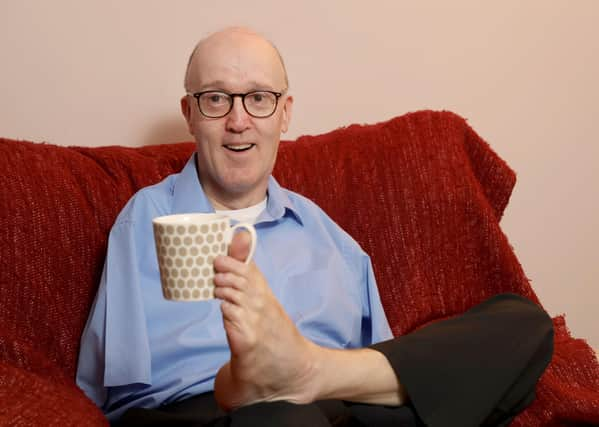

One of the major pains of life during a pandemic is that you have to speak to really interesting people like Brian Gault over the phone rather than meet in person.
As he describes how he shakes hands and writes with his feet, and how he drives a car using his toes I want to be there to witness these miracles of human spirit.
Advertisement
Hide AdAdvertisement
Hide AdBrian and his wife May are being rightly cautious of coronavirus due to Brian’s health condition – he was born with no arms after his mother took two Thalidomide tablets to treat morning sickness – which leaves the 59-year-old with low immunity.
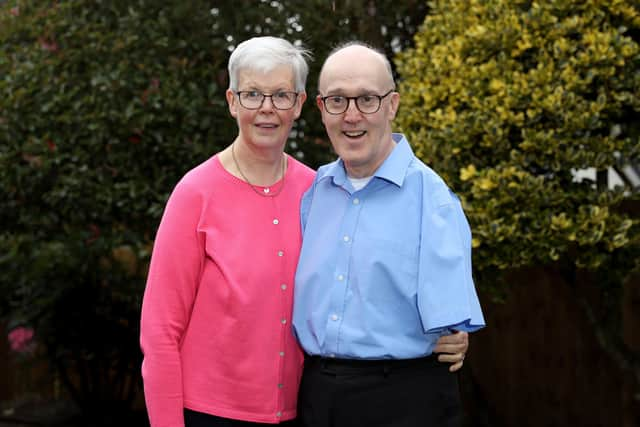

As my interview would take at least an hour it was best I didn’t come into their Broughshane home, though thankfully photographer Laura Davison was able to pay a quick and safe visit to capture some striking snaps of Brian and May.
Having written a book ‘Look, No Arms’ about learning to live without arms Brian has been travelling the world telling his story, or at least he had been up until March’s travel restrictions.
His work with Thalidomide survivors in Brazil and disabled children around the world saw him pick up an MBE earlier this month.
Advertisement
Hide AdAdvertisement
Hide AdI ask him to share his amazing story one more time, starting with his entry into the world.
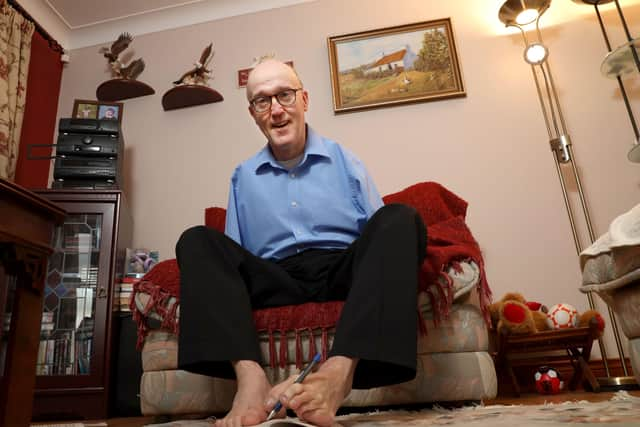

“It was touch and go whether my mum would survive the birth, but thankfully she did,” he said. “They took me away from my mum for many, many hours after I was born. She said, ‘Brian, I thought you were dead’.
“When they brought me to my mum I had a wee shawl around my shoulders.”
Then came the news that Brian had been born without arms. He said: “My mum and dad were in despair when I was born with no arms. They got no answers for over a year after I was born. It was because of two Thalidomide tablets my mum took for morning sickness back in 1961.”
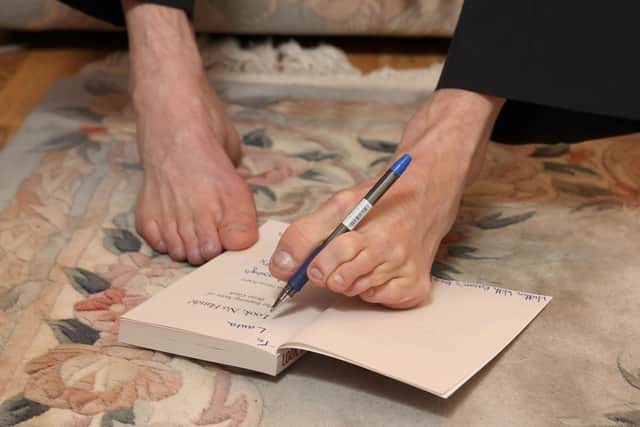

Advertisement
Hide AdAdvertisement
Hide AdAlthough Brian has gone on to achieve great things he has feelings of regret that neither his mother or father lived to see him publish a book in 2000 and receive an MBE.
He said: “My father died in 1994 and my mum in 1998. I know if they were here today they’d be thinking back 59 years ago to when they were in despair, wondering what was the future for their third of four children, and here I am being honoured by the Queen and by our nation for the work that we’ve done around the world, helping boys and girls in Brazil and 11 different countries around the world.”
Brian grew up in Ballyclare and now lives in Broughshane with his wife May, having spent a large part of his life living on the Isle of Man.
The worst experiences of his life came when he was given prosthetic limbs. He said he preferred having no arms: “From a very early age my big brother and big sister would put things in between my toes – toys, sweets, spoons to feed myself. It was very natural, when I was a wee boy I thought my feet were my hands.
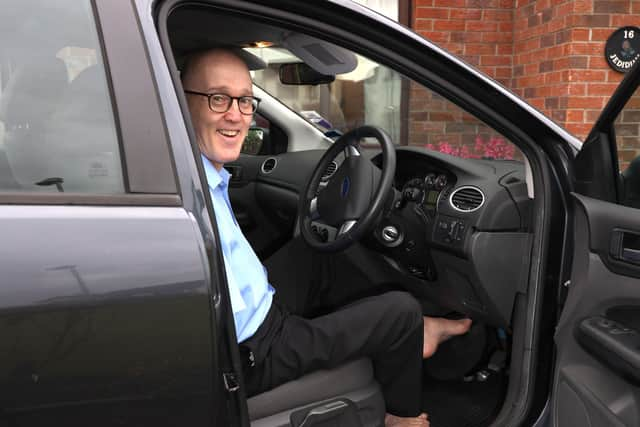

Advertisement
Hide AdAdvertisement
Hide Ad“When I was two and half years old I was told I was going to Edinburgh to get my arms. When I got to Scotland to the Princess Margaret Rose Hospital, mum and dad said goodbye after being there for a few hours. I didn’t see them again for the next 10 weeks. I thought they didn’t love me anymore.”
Describing his new metal arms, he said: “They were heavy, they were cumbersome. When they put them on my shoulders I fell over because of the weight of them.
“They hurt me so much. After being at the hospital for 10 weeks, one day mum and dad came back. They said Brian, ‘we’ve come to take you back to Ballyclare’. As a wee boy I said, ‘Yesssssss, mum and dad still love me’.
“There was a bit of a novelty factor with the old metal arms in the beginning. We lived in a small holding, a wee farm with just a few pigs and hens and ducks and geese running around.
Advertisement
Hide AdAdvertisement
Hide Ad“The neighbours would come around and I would show off my metal arms.
“But you know the metal arms weren’t part of me. I struggled with those arms. They pulled me down, they slowed me down.
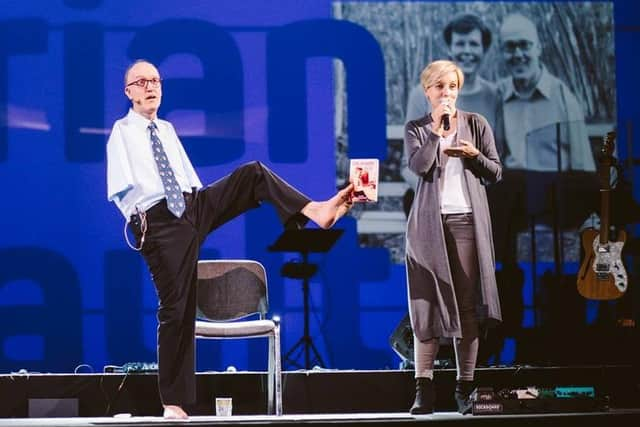

“When my mum or dad took those arms off my shoulders I felt free.
“I could go out and run around with all the other boys and girls, kicking football, doing all the other things children would do.”
Advertisement
Hide AdAdvertisement
Hide AdHe continued: “When I was eight, in 1970, my family moved to the Isle of Man to live. When we moved over there my three siblings had no problem getting into a wee primary school in Douglas.
“Mum and dad took me along to three wee schools. All the head teachers said the same thing – ‘we’re sorry, Brian will have to go to a special school’.
“And so mum and dad had to make very difficult, tough love decisions. It’s only now when I look back I understand.
“I had to go back to a special school in Belfast – Fleming Fulton. I’d already been going to that school when I lived in Ballyclare.
Advertisement
Hide AdAdvertisement
Hide Ad“They said they would have me back as a boarder. I was only eight and a half years of age when my mum and dad told me I was going to boarding school in Belfast. This was 1970, at the height of the Troubles.
“It meant I was away from my family for nine months of the year. I only went home for Christmas and Easter and the eight weeks in July and August. As you can imagine I was homesick. It was hard as a boy.”
He admitted his sometimes misused his arms: “When I went home to the Isle of Man during the summer some of the children would tease me because I was different. I did things I know I should never have done.
“Those arms had a good right hook. Sometimes those children would tease me and once or twice with the right hook of those arms I nearly knocked them out. They wouldn’t ask me again in a hurry why I had no arms.”
Advertisement
Hide AdAdvertisement
Hide AdBrian said the turning point in his life was at 13 when he was told he would no longer have to wear his metal arms.
“A weight was lifted in every sense,” he said. “Those arms were not part of me.”
It was also the age at which Brian became a Christian: “When I was 13, there was one of my friends in school – he loved Jesus. When I saw the difference in him – he had a peace in his heart and a joy that I never had.
“That 13th year I said, ‘God, if you’re up there in your heaven would you forgive me, would you come into my heart and take away all my anger. He did that in my 13th year.
Advertisement
Hide AdAdvertisement
Hide Ad“I was angry at God for the first 13 years of my life, but he forgave me and accepted me, and over all these years I’ve been able to be an encourager to many, many people throughout the world. It’s been a joy to be able to do that.”
He added: “I could still be angry at that German company (Thalidomide manufacturers), but God knew that I was going to be born with no arms. He was not surprised. He has turned around what seemed like a disaster.”
Thalidomide was used to treat nausea in pregnant women in the 1950s and early ‘60s, subsequently resulting in birth defects.
Brian said: “In the UK there were over 500 Thalidomiders, just like myself, with no arms, limbs, with different disabilities.
Advertisement
Hide AdAdvertisement
Hide Ad“Around the world nearly 10,000 babies were born like myself. In Germany where the drug was invented there are over 2,800 Thalidomiders. When I was at Fleming Fulton school there probably was about 10 or 12 of us.”
Because of his condition Brian said he was often written off: “I left school with seven O-Levels. Nobody thought I’d ever pass any O-Levels. When I was 13 my reading ability was that of a seven-year-old.
“When I left school I went to college in Coventry, while I was there at the age of 17 I learnt to drive a car.
“Today for people with disabilities technology has moved on. Back then it was pretty basic.
Advertisement
Hide AdAdvertisement
Hide Ad“The first car I had was a wee Mini car, it was all foot control. There was a little infrared receiver box with about 12 buttons on it. I pressed those buttons with my toes. That did the lights and the wipers and the indicators and the horn.
“After 12 lessons I had my test, I passed fist time. I was determined to get on the road.
“I often say to people, ‘if you’re ever struggling to pray come for a wee spin in my car because I’ll get you praying. You’ll be saying, ‘that man’s crazy how he drives that car with his feet, without touching the steering wheel’.
“They talk about these driverless cars. I’ve been doing it for 48 years with my toes.”
Advertisement
Hide AdAdvertisement
Hide AdBrian explained how God guided him to help others through his story: “In 1987 the Lord spoke into my heart and told me to give myself to the poor and needy and the oppressed.”
Six years later he was watching a documentary about Brazil when tears came rolling down his cheeks: “They showed you little boys and girls with no limbs because their mothers had been given Thalidomide to treat leprosy.
“I was angry, it was a righteous anger. The Lord spoke into my heart and told me to help those children in Brazil. He told me to write my life story and use the proceeds to help disabled children.”
Brian and May have been to 34 different countries to share that story.
Advertisement
Hide AdAdvertisement
Hide AdHe commented: “I used to wonder would I ever get married – a man with no arms. I had to wait until I was 38 before I found my wee treasure – my wife May.
“I used to wonder about how I’d tuck my shirt in, then one day God said ‘Brian, don’t you worry, I’m going to send you a lovely girl, she’ll be your shirt-tucker-inner’.”
Despite his rosy outlook Brian is in constant pain: “Because I have no arms I have to use my legs all the time. Over 80% of us Thalidomiders are living on painkillers because of wear and tear of usage.”
He added: “Because I’m not travelling to tell my story I’m out in the garden these days, enjoying doing a bit of weeding with my toes.”
A message from the Editor:
Advertisement
Hide AdAdvertisement
Hide AdThank you for reading this story on our website. While I have your attention, I also have an important request to make of you.
With the coronavirus lockdown having a major impact on many of our advertisers - and consequently the revenue we receive - we are more reliant than ever on you taking out a digital subscription.
Subscribe to newsletter.co.uk and enjoy unlimited access to the best Northern Ireland and UK news and information online and on our app. With a digital subscription, you can read more than 5 articles, see fewer ads, enjoy faster load times, and get access to exclusive newsletters and content. Visit https://www.newsletter.co.uk/subscriptions now to sign up.
Our journalism costs money and we rely on advertising, print and digital revenues to help to support them. By supporting us, we are able to support you in providing trusted, fact-checked content for this website.
Alistair Bushe
Editor